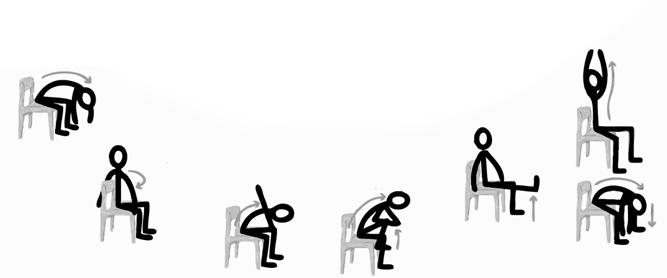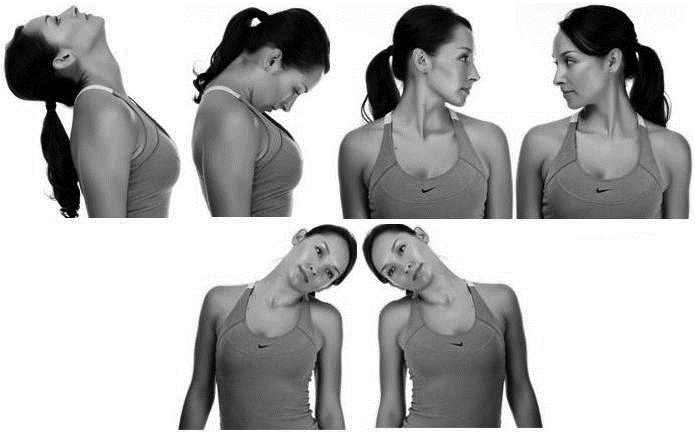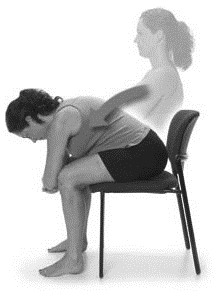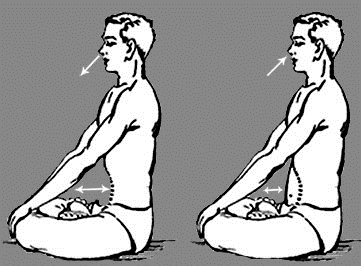Desktop Yoga
Desktop Yoga
According to the statistics, Carpal Tunnel Syndrome (CTS) & Repetitive Stress Injuries (RSI) have dramatically increased in the past years, since the evolution of the personal computer. In United States, more workers are injured using a computer keyboard than operating any other tool.
Tips for prevention
The most important thing to do is to take your eyes off, your computer screen and gaze into the far distance every half an hour. Drink a glass of water at a regular interval of time. Stay aware of your posture while you are sitting on your chair. During the lunch break involve yourself in physical exercises. Include full body stretch in your daily activity. Check that your workstation is set up correctly. Computer screen should be at eye level or below the eye level. Follow some exercise programmes that include upper body strength. The programme must also include exercise for flexibility, to stretch out the contracted muscles of the wrist, arm, shoulder, neck and upper back. Stretch your body before you go to bed at night. Observe your sleeping positions. Make sure that you have the right pillow height for sleeping. The neck should be supported, but too many pillows will create problems as well. The neck should be in line with the rest of the spine.
Desktop Yoga
Easy Desktop Yoga is a series of exercises based on yoga and designed specifically for working people. Simple and easy modified yoga exercises help you to calm, invigorate and relax. Desktop Yoga is the perfect solution for those who want a simple, relaxing workout which they can perform while sitting at their desks. It is excellent for reducing stress during a long workday. This programme targets the muscles that are mostly affected while sitting for a long period of time. It is divided by body part, so you can choose how long you want to work out.

Recommended Yoga exercises
Here are some desktop yoga-based exercises which can be done in the office during the course of the day to help prevent CTS and RSI. Hold the positions for a few breaths and let the stretch increase, but do not force it. The most important part of each exercise is to become aware of your body and breathe.
Full body stretch - TAD ASANA (Tree Pose)
 Exhale and inhaling take both the arms up above the head from the sides and join the palms at the top.
Exhale and inhaling take both the arms up above the head from the sides and join the palms at the top.- Lift the heels and stand on the toes and pull the whole body upward.
- Continue smooth breathing.
- Pull the hands upward as much as possible.
In this asana all the muscles stretch in one direction at one time and then relaxed. This process helps to remove all the strains. The muscles get rest and relaxed.
Hand exercise
Sit straight. Keep both your hands straight forward. Make strong fist & open it. Repeat it for 10 times with enough strength. Make strong fist and rotate clockwise 10 times and anti-clockwise 10 times. Pull your both hands with strength while inhaling and push your both hands forward while exhaling.
Shaking out tension
Shake out your wrists and arms, letting them dangle from your shoulders. Rotate your shoulders forward and back.
Neck exercises
Sit straight on your chair with feet firmly on the floor. Keep your hand straight on the seat back. Extend the torso and drop the chin into the chest.

First set
While inhaling turn your head to the left side and hold for 10 seconds. Exhaling turns your head to the right side and hold for 10 seconds. Repeat it twice. Come to the centre while inhaling. Tilt your head down to the right and hold for 10 seconds. Tilt your head left and hold for 10 seconds. Repeat it twice and come to the centre. While inhaling tilt your head back and hold for 10 seconds. Exhaling tilt your head down and hold for 10 seconds. Repeat it twice and come to the centre. While inhaling tilt your head back and rotate your head slowly clockwise and anticlockwise for 5 rounds. Come to the centre.
Second set
Place your right palm on your right side of the head and resist. Repeat from left side as well. Place both your palms on your forehead and resist. Interlock your fingers to place it in your back of the head and resist.
Release the neck
Shrug the shoulders high up to the ears and then release and drop. Repeat at least 3 times.
Back exercise (FORWARD BENDING)

Sit on a chair, spread the legs apart. Stretch both arms up and then bend forward, placing both palms on the floor. Hold on to the posture for 10-25 seconds and release. Repeat the same movement 5 times.
Opening the chest
Interlock your fingers behind your back with the palms facing the torso. Roll the shoulders back, but keep the ribs from poking forward. Stretch your elbows and arms on the exhale and hold it for a few breaths. On the exhale, bend your elbows and bring your wrists to the right side waist, gently pressing the right elbow towards the left. Release and do the other side.
Opening the mid-back (HUG YOUR BODY)
Hug your body, placing the right hand on your left shoulder and left hand on your right shoulder. Breathe into the area between your shoulder blades. Exhaling brings the arms straight down, the palms facing each other. Stretch the fingers up, and on the next exhale, raise the elbows up to shoulder height. Hold for a few breaths and then repeat on the other side.
Back exercise (SIDE STRETCHING)
Hold chair with one hand. Stretch the other arm up and bend sideways. Hold on to the posture for 10-25 seconds and release. Come back to the starting position and repeat on the other side. Repeat it thrice.
Pawanmuktasana (ABDOMINAL MASSAGE)
 Sit straight on a chair, bend your right leg, interlock your fingers and hold your knee.
Sit straight on a chair, bend your right leg, interlock your fingers and hold your knee.- While exhaling pull your knee up to the chest.
- Hold for 20 seconds, release it while inhaling.
- Repeat it with the left side as well.
Ardhamatsyasana (TWISTING THE TORSO)
With the feet planted firmly in the ground and the thigh bones pressing into your chair, inhale to take your right leg up and cross it to the left side. Place your right hand straight on the chair. Hold your knee with left hand and press on the abdomen while exhaling. Inhale to take it up and exhale to bring it down. Repeat it with the other leg as well. Remember to keep breathing slowly and deeply as you twist.
Leg exercise
While standing place your one leg on chair and stretch your toes hamstring muscle by pulling your toes in. While inhaling takes both your legs up and exhaling bend forward keeping your back straight. Try to hold your toes with both the hands. Hold for 20 seconds. Inhaling come up. Repeat it with other side as well.
Relax the eyes
Turn your head right and left, looking into the far distance with your eye gaze. Close your eyes and take some deep, slow breaths with your belly soft. You can do it without moving your head as well.
Sahaj Pranayama
Sit in a chair with a straight back. Close the eyes and relax, keeping the spine and body straight. Focus all attention on the navel region - the point of fire in the body. Inhale deeply; tilt your chin down to touch collar bone. Hold your breath for a count of 10. Raise your chin up and exhale through the mouth. Repeat the three stages of this cycle in a rhythmic fashion. Practice up to 5 rounds.
DON'TS : People with cervical spondylosis should not press the chin down. They can keep their chin up.
Kapalabhati
Sit in a comfortable position with a straight spine. Take two or three deep inhales and exhales. Inhale deeply to exhale sharply and forcefully through the nostrils, drawing the belly in as you exhale and producing a puffing sound. Let the inhalation happen passively, and continue this cycle of forceful exhalation and passive inhalation at a fast pace, so that the belly is pumping continuously. At the same time, receive auto suggestion about in

creased flow of blood circulation, detoxification and vitalization of the vital organs viz. kidney, small intestine, large intestine, prostate gland, liver, gallbladder, pancreas, spleen and lungs etc. Practice the process for 2.5-15mins. You may take short breaks when you start out on this yogic breathing exercise.
Benefits
Kapalbhati means the exercise which makes the forehead luminous & lustrous. This Pranayama supplies pure life energy to the brain. It increases the blood circulation in the brain and removes blood clots, thereby improving the memory power. Other than this the toxins and foreign substances from the body are evacuated. It cures cold, sinusitis, allergy, tension and other diseases. It is very useful in case of phlegm, skin disease, asthma, heart diseases, low blood pressure, depression, tiredness, laziness, sleeplessness, migraine, joint pain, obesity, diabetes, constipation, indigestion, acidity, gastric problem and other diseases pertaining to the kidneys and prostate gland etc. are also cured. As a result, the whole body becomes healthy and disease free.
Source: Ministry of AYUSH
Last Modified : 6/14/2021
This topic provides information about guidelines f...
This topic provides information about Internationa...
This topic covers the Information related to Guide...
This topic gives complete Information related to D...
